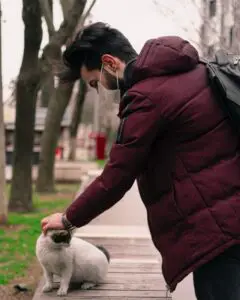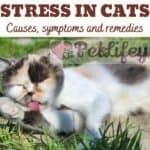
Separation anxiety is often evoked in dogs who cannot bear to be separated from their master and to be left alone at home. But did you know that cats can also suffer from this anxiety disorder? Yes, contrary to what one might think, our feline friends are just as attached to their humans as dogs! But separation anxiety usually goes unnoticed in cats. However, it can lead to depression and even death. It is therefore essential to know how to detect it as quickly as possible in order to be able to treat it. Here are some signs that indicate that your cat is having a very bad time seeing you leave!
Please note that all the symptoms described below may also indicate that your cat is suffering from other illnesses. So, if your cat has one or more of these symptoms, a visit to the veterinarian is in order.
1. It relieves itself on your things
When you come home from work, are you regularly surprised to find pretty smelly gifts left by your cat on your clothes or in your bed? Rest assured, this does not mean that it seeks revenge for being left alone.
In fact, it’s a sign that your absence is stressing them out. And the only way it has found to calm down is to urinate or defecate on your things. Indeed, it allows them to mix their scent with yours, which is particularly soothing for them. Plus, it can also be a way to help you find your way home more easily …
2. It meows a lot
Whether it’s when you leave, when you return or when you’re away, your cat tends to meow almost desperately, sometimes for hours (according to your neighbors)? This is the obvious sign that staying alone is anxiety!
Note that some cats suffering from separation anxiety tend to hide when their human is about to go out.
3. It has a destructive behavior
Your cat is unlikely to do as much damage as a dog in your home. However, it can adopt a slightly destructive behavior. For example, it may start scratching doors and furniture while you are away.
4. It licks itself excessively
It’s normal for your cat to groom several times a day. On the other hand, excessive licking is not to be taken lightly. Indeed, if your cat spends their time licking itself, it may be because it soothes them. And for good reason, excessive licking in cats is a way of externalizing stress, a bit like us when we bite our nails.
If your cat licks itself a lot, then hairless areas may start to appear on her body.
5. It loses their appetite

If your cat refuses to eat when you’re about to leave or while you’re away, that’s a sure sign that it’s suffering from separation anxiety.
In addition, their stress level may be so high that it may even experience vomiting and diarrhea.






